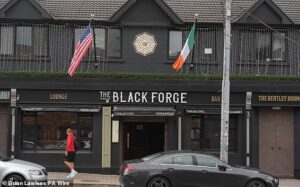By RICHARD MARSDEN, GENERAL REPORTER
Published: | Updated:
A conman with a string of convictions including identity fraud to steal people’s homes has finally lost a 25-year legal fight against deportation to his native Zambia.
Alick Kapikanya, now 57, has been fighting deportation since his first conviction in 1992, when he was warned he could be removed from Britain.
His crimes began with attempted fraud and theft, then he progressed into being part of a gang which stole elderly people’s identities to take ownership of their homes, remortgage them and pocket the cash.
While his crimes caused misery – with victims having to mount court fights to regain their properties – Kapikanya travelled in chauffeur-driven limousines, stayed in luxury West End hotels and gambled away £170,000 in a single night.
After challenging five deportation orders, most recently from 2016, via immigration tribunals, the criminal’s luck has now finally run out.
In a ruling at the end of July, Appeal Court judges Lord Justice Bean, Lord Justice Peter Jackson and Lord Justice Baker ordered Kapikanya be deported.
They wrote: ‘[Kapikanya] has been the subject of five decisions that he should be deported over a period of a quarter of a century.
‘The system of appeals and orders for reconsideration has served him well in enabling him to remain in the UK throughout that period.’

Kapikanya was first warned he was at risk of being sent back to his native Zambia in February 1992 after he was convicted of attempted fraud.
In March 2000, after serving a prison sentence for theft, he lost an appeal against deportation, but no order to remove him from the country was ever made.
The conman was then convicted of dishonesty in 2008 and again notified of his liability to deportation.
On 12 March 2013, then Home Secretary Teresa May made a decision to deport him but he successfully appealed and was granted leave to remain until 15 April 2016.
In the meantime, Kapikanya was convicted of conspiracy to defraud in 2014, in relation to the £3.5m housing scam, and jailed for six years.
Manchester Crown Court heard he led a gang of con artists that stole the identities of elderly people across Greater Manchester and the north west. The gang secretly seized ownership of their houses and then repeatedly re-mortgaged them, the court was told.
Horrified homeowners had to fight to reclaim legal ownership of their own houses whilst Kapikanya, then of Stretford, Greater Manchester, splashed the cash on a luxury lifestyle.
Four homes were targeted in Worsley, Greater Manchester, one each in the villages of Hale and Malpas, Cheshire, and three properties owned by a couple in Sleaford, Lincolnshire. It was the eleventh time Kapikanya had been convicted of a crime in this country.

Yet another deportation order was made on 3 February 2016 – but he challenged removal via the Court of Appeal and his case was returned to a First-tier Tribunal.
It took another seven years for the case to be heard and Kapikanya was allowed him to remain in January 2023 based on the ‘unduly harsh and very compelling’ impact on his son, who was 17 at the time.
The Home Office successfully challenged the decision in the Upper Tier tribunal, leading to Kapikanya to go to the Court of Appeal.
In the latest hearing, the Appeal Court heard he came to the UK in April 1983, aged 14, to be adopted. The adoption fell through and, the court heard, Kapikanya was ‘assimilated into a religious cult’.
Now married with a 20-year-old son, at an earlier appeal hearing Kapikanya argued he was in remission from stomach cancer and was suffering from anxiety. He was described as being ‘socially and culturally integrated into the United Kingdom’ with ‘no familial or social links with Zambia’.
Barrister Zane Malik KC argued deportation would be ‘unduly harsh’ on Kapikanya’s son. Mr Malik added ‘over and above’ that the fact Kapikanya has lived in the UK for 42 years also constituted ‘very compelling circumstances’.
But the panel of judges said Home Secretary Yvette Cooper ‘should now, at last, be allowed to put the November 2016 deportation order into effect.’
Describing the impact of the property fraud at the time Kapikanya was sentenced, Ben Southam, senior crown prosecutor, said: ‘The mortgages and loans were obtained against houses they did not own, and without the knowledge of the real homeowners.’
The true owners ‘knew nothing about the loans’ and were caused ‘considerable distress and inconvenience’, he added.








